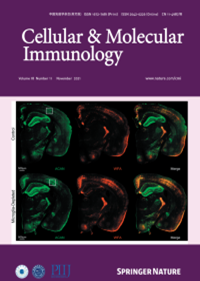Metabolic rewiring controlled by HIF-1α tunes IgA-producing B-cell differentiation and intestinal inflammation
IF 21.8
1区 医学
Q1 IMMUNOLOGY
引用次数: 0
Abstract
Germinal centers where B cells undergo clonal expansion and antibody affinity maturation are hypoxic microenvironments. However, the function of hypoxia-inducible factor (HIF)-1α in immunoglobulin production remains incompletely characterized. Here, we demonstrated that B cells lacking HIF-1α exhibited significantly lower glycolytic metabolism and impaired IgA production. Loss of HIF-1α in B cells affects IgA-producing B-cell differentiation and exacerbates dextran sodium sulfate (DSS)-induced colitis. Conversely, promoting HIF-1α stabilization via a PHD inhibitor roxadustat enhances IgA class switching and alleviates intestinal inflammation. Mechanistically, HIF-1α facilitates IgA class switching through acetyl-coenzyme A (acetyl-CoA) accumulation, which is essential for histone H3K27 acetylation at the Sα region. Consequently, supplementation with acetyl-CoA improved defective IgA production in Hif1a-deficient B cells and limited experimental colitis. Collectively, these findings highlight the critical importance of HIF-1α in IgA class switching and the potential for targeting the HIF-1α-dependent metabolic‒epigenetic axis to treat inflammatory bowel diseases and other inflammatory disorders.

由HIF-1α控制的代谢重新布线可调节产生IgA的B细胞分化和肠道炎症。
B 细胞进行克隆扩增和抗体亲和力成熟的生殖中心是一个缺氧的微环境。然而,低氧诱导因子(HIF)-1α在免疫球蛋白产生过程中的功能仍未完全定性。在这里,我们证明了缺乏 HIF-1α 的 B 细胞表现出明显较低的糖代谢和 IgA 生成障碍。B 细胞中 HIF-1α 的缺失会影响产生 IgA 的 B 细胞分化,并加剧右旋糖酐硫酸钠(DSS)诱导的结肠炎。相反,通过 PHD 抑制剂 roxadustat 促进 HIF-1α 的稳定可增强 IgA 类的转换并缓解肠道炎症。从机理上讲,HIF-1α通过乙酰辅酶A(acetyl-CoA)的积累促进IgA类的转换,而乙酰辅酶A对于组蛋白H3K27在Sα区的乙酰化至关重要。因此,补充乙酰辅酶A可改善Hif1a缺陷B细胞的IgA生成缺陷,并限制实验性结肠炎的发生。总之,这些发现凸显了HIF-1α在IgA类别转换中的关键重要性,以及靶向HIF-1α依赖的代谢-表观遗传轴治疗炎症性肠病和其他炎症性疾病的潜力。
本文章由计算机程序翻译,如有差异,请以英文原文为准。
求助全文
约1分钟内获得全文
求助全文
来源期刊
CiteScore
31.20
自引率
1.20%
发文量
903
审稿时长
1 months
期刊介绍:
Cellular & Molecular Immunology, a monthly journal from the Chinese Society of Immunology and the University of Science and Technology of China, serves as a comprehensive platform covering both basic immunology research and clinical applications. The journal publishes a variety of article types, including Articles, Review Articles, Mini Reviews, and Short Communications, focusing on diverse aspects of cellular and molecular immunology.

 求助内容:
求助内容: 应助结果提醒方式:
应助结果提醒方式:


